These are the best Easy Overnight Pickles! They give you the tangy, crunchy goodness of pickles in just a few easy steps. Waiting overnight is the hardest part!
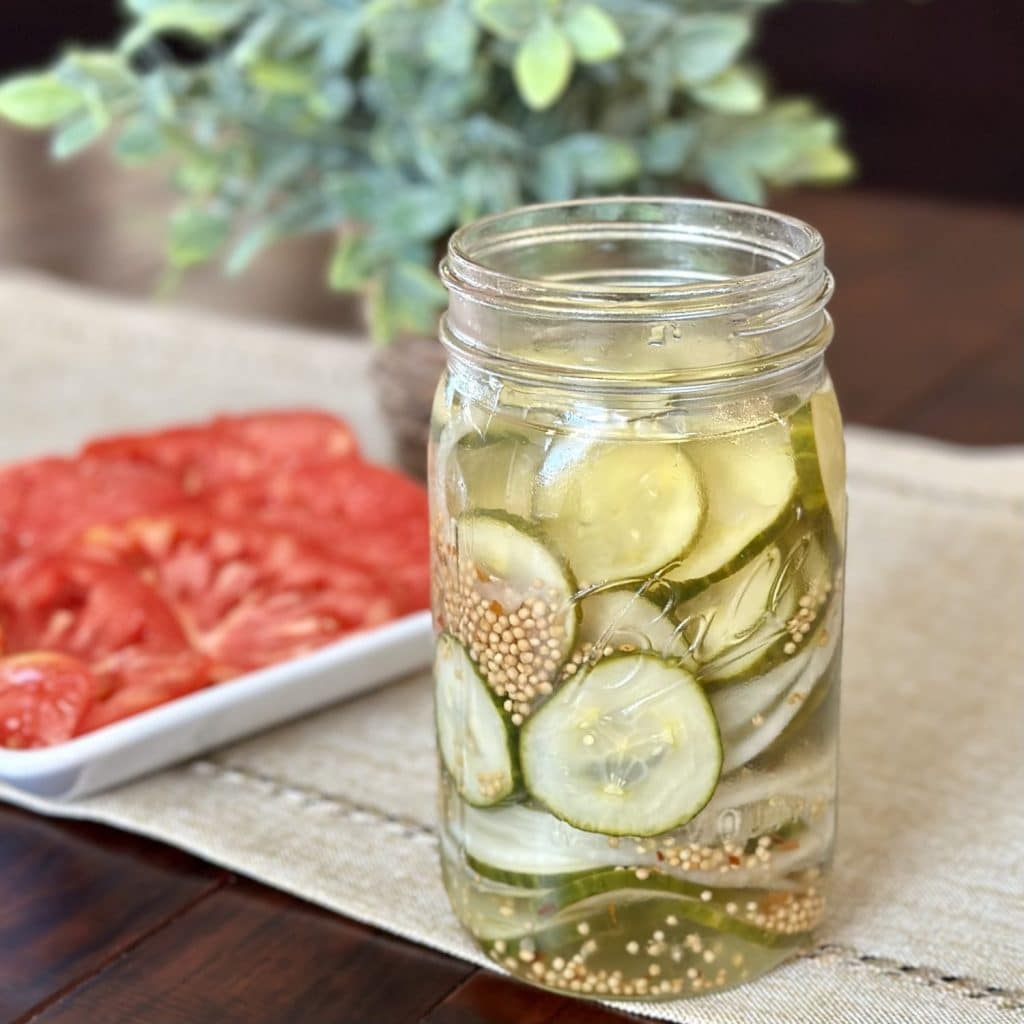
I’ve always been a big fan of pickles but making them, not so much! Unless it’s fresh green beans, the whole pressure-cooking, canning process isn’t my forte. These overnight pickles, also known as refrigerator pickles, are a lot easier and absolutely delicious!
Table of Contents
What You’ll Need
Ingredient Amounts Listed in the Recipe Card Below
Save The Recipe!
Add your email below and we’ll send it straight to your inbox+ you’ll receive all our newest recipes!
- English Cucumbers
- Yellow or Sweet Onion
- Distilled White Vinegar
- Sugar
- Mustard Seeds
- Kosher Salt
- Crushed Red Pepper Flakes
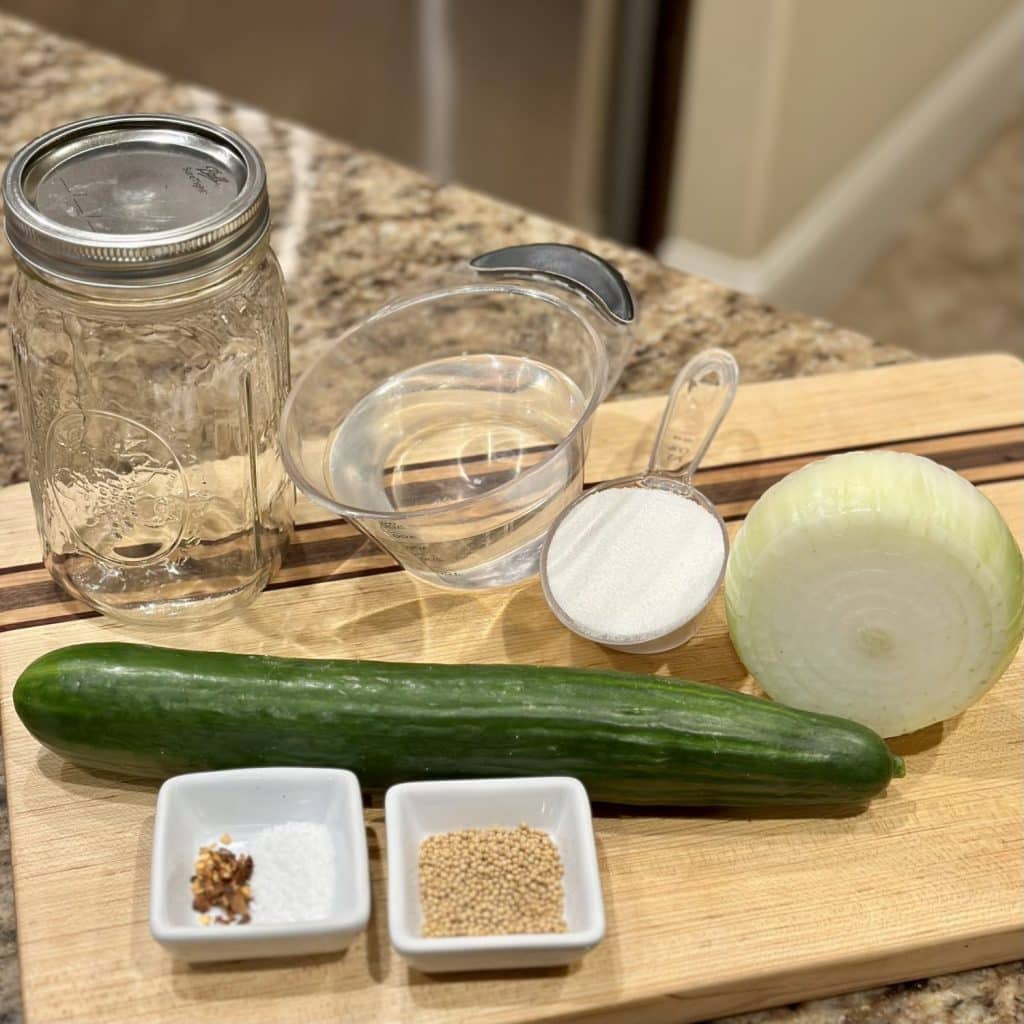
Tools You’ll Need
- Small Saucepan
- Chef’s Knife or Mandolin
- Cutting Board
- Glass Quart Jar
Why You’ll like this Recipe
- It takes less than 10 minutes to prep the pickles before refrigerating!
- You can enjoy the flavor and satisfaction of homemade pickles without the complex canning processes!
- You can customize the pickles with your favorite flavors!
- They’re super tangy and crunchy with the perfect sweet and savory balance of flavors!
How to Make this Recipe
- In a saucepan, combine vinegar, salt, crushed red pepper flakes, sugar and mustard seeds. Place the saucepan over medium heat and stir the mixture until the salt and sugar have completely dissolved, about 5 minutes. Remove the brine from heat and let it cool for a few minutes.
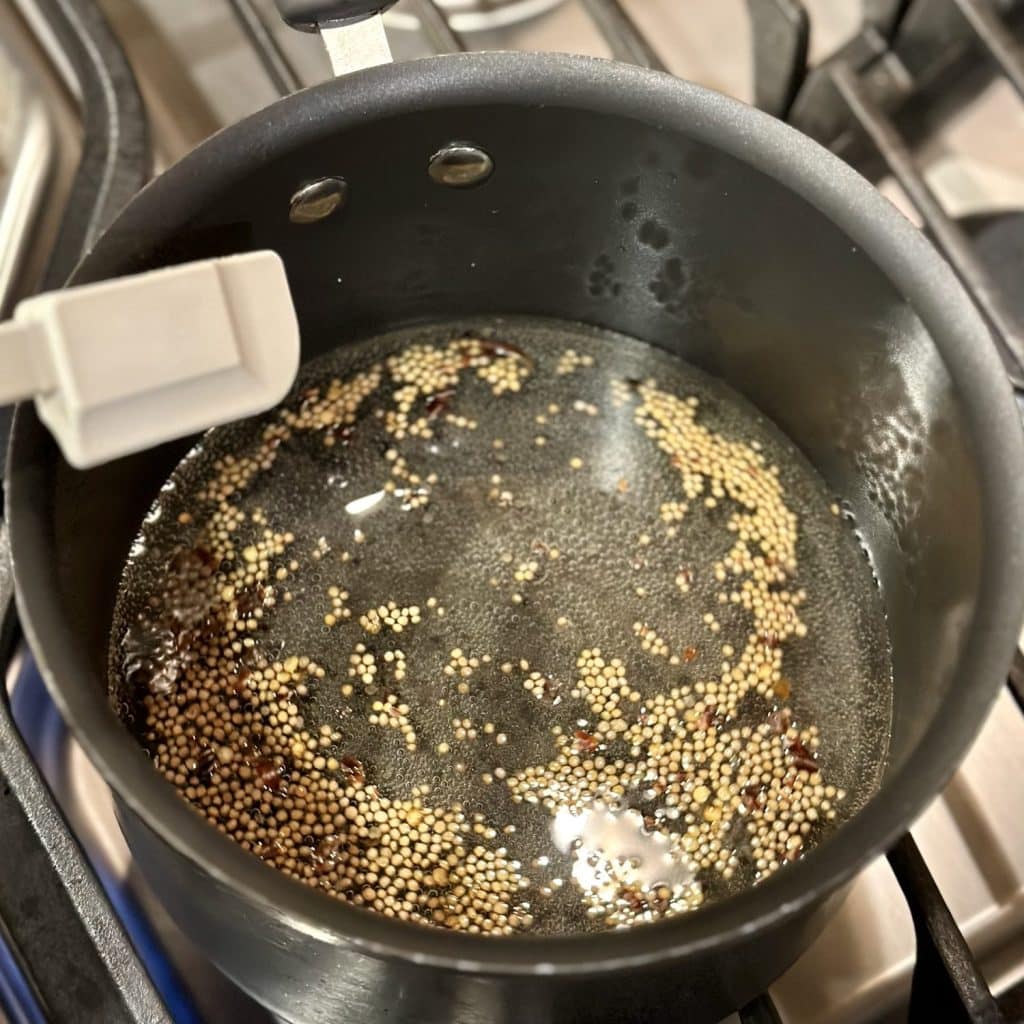
- Wash the cucumbers thoroughly. Trim off the ends, and then slice them into ⅛-1/4 inch slices.
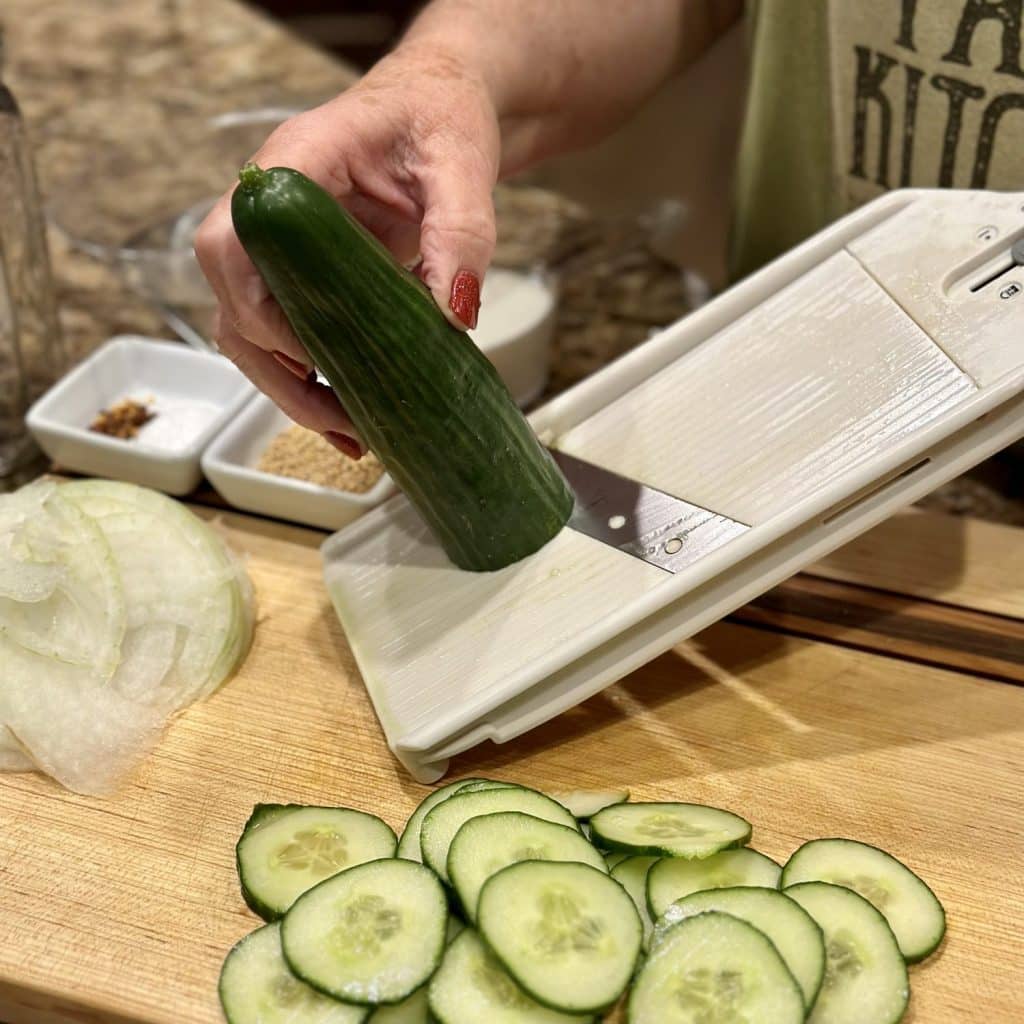
- Take a clean glass jar with a tight-fitting lid and pack the sliced cucumbers and onions into it in layers. Make sure to leave about an inch of headspace at the top of the jar to allow for expansion.
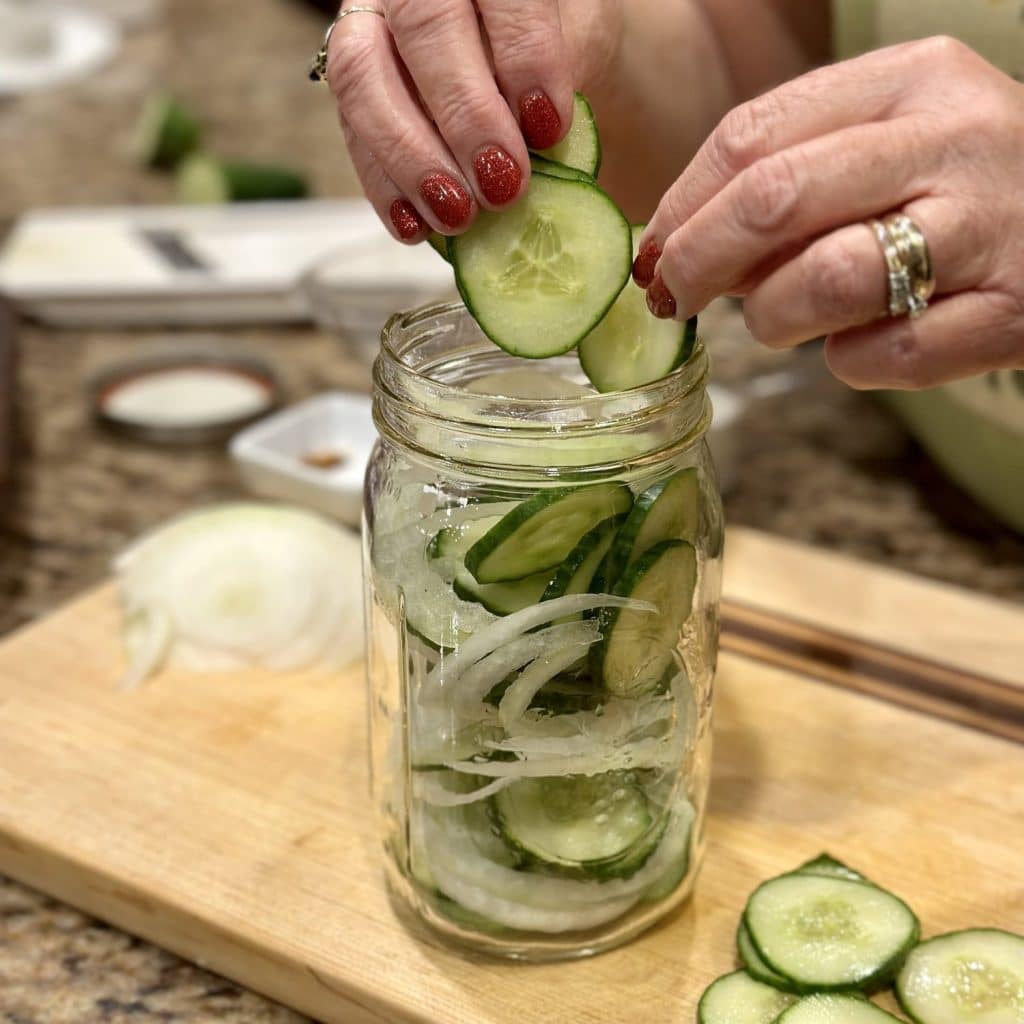
- Once the brine has cooled, carefully pour it over the cucumbers, ensuring they are fully submerged. The brine should cover the cucumbers completely. If needed, use a clean spoon to press down the cucumbers gently.
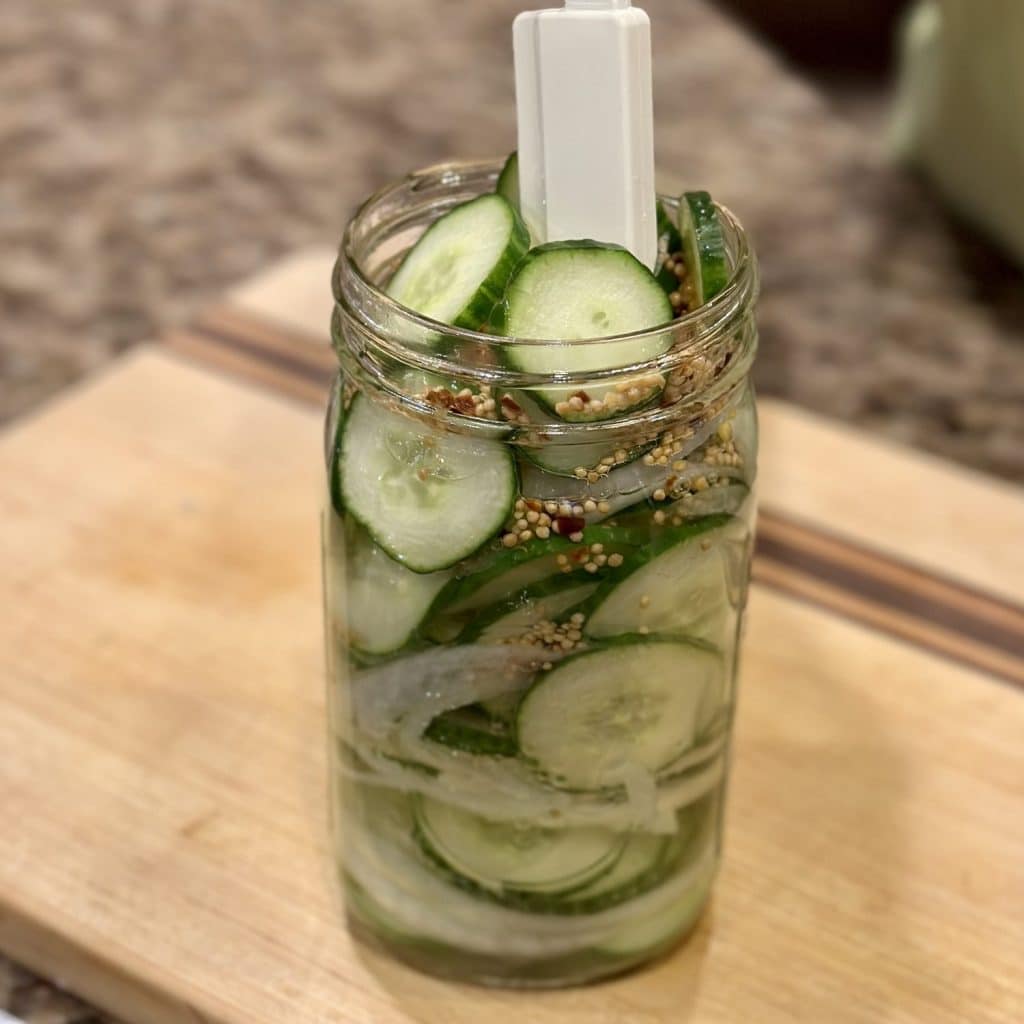
- Seal the jar tightly and refrigerate it overnight, or for at least 8 hours.
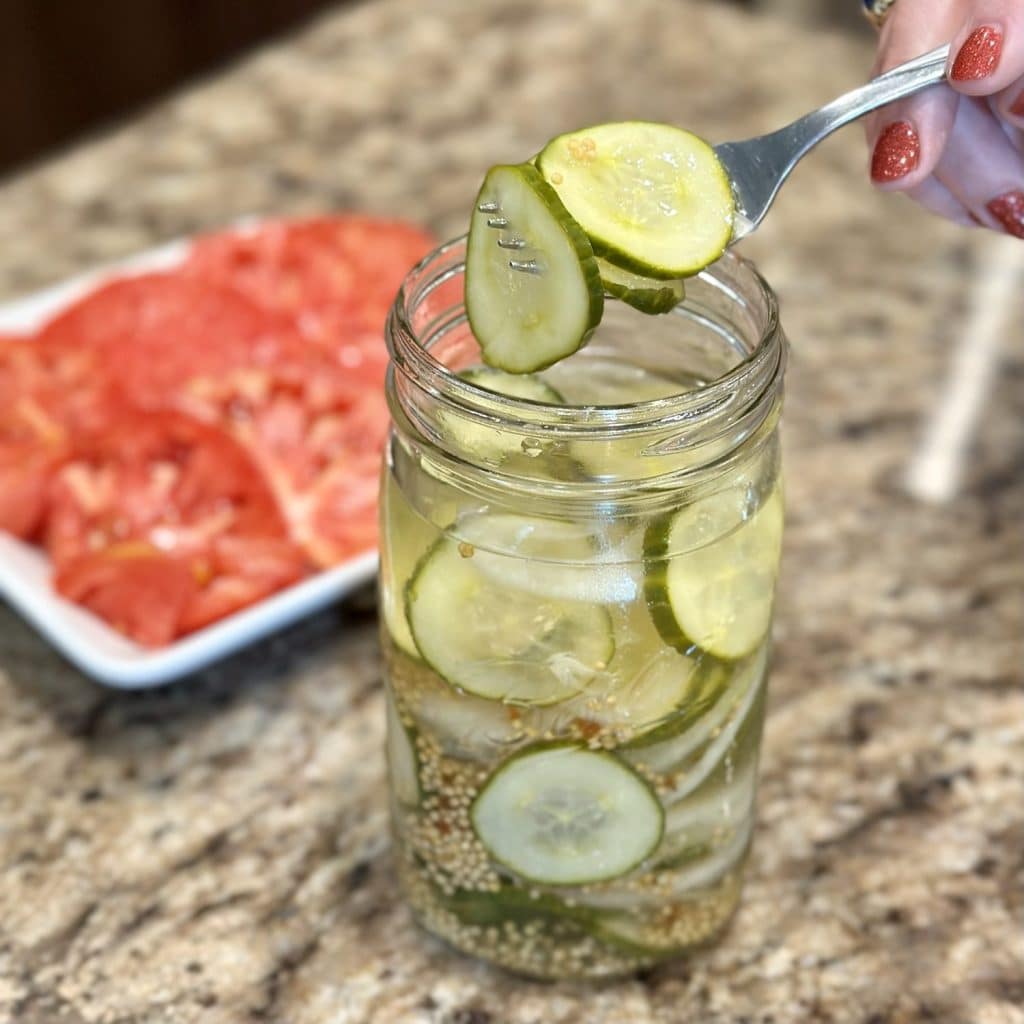
Tips and Substitutions
- Do not make refrigerator pickles in a plastic container as the acidic solution will leach plastic into them.
- Make sure your cucumbers are completely covered with the liquid.
- Feel free to customize your pickles by adding fresh garlic, fresh herbs like dill, rosemary and thyme and other spices like peppercorns, coriander seeds or bay leaves.
- Adjust the sweetness and tanginess: If you prefer sweeter or tangier pickles, adjust the amount of sugar or vinegar accordingly.
- You can experiment with other cucumber varieties as well, such as pickling cucumbers, mini cucumbers or Persian cucumbers.
- If you're short on time, you can still make quick pickles by reducing the marinating time to a few hours. However, keep in mind that the flavors may not develop as fully.
Storage
- Refrigerate overnight or up to 4 days before enjoying. This recipe is not shelf stable, so you need to leave it in the refrigerator. These pickles are best enjoyed within 2 weeks of making. It is not recommend to freeze and thaw.
Frequently Asked Questions
- Are easy overnight pickles (refrigerator pickles) safe?
- Refrigerator pickles that call for enough vinegar (5% acetic acid) can be safely stored in the refrigerator below 40°F up to a month. Some recipes claim a longer refrigerator-shelf life.
- How many cups of sliced cucumbers is 1 pound of English cucumbers?
- One pound will yield about 3 cups of sliced cucumbers.
- How long do easy overnight pickles last?
- They can be stored in the refrigerator for up to a few weeks. However, they’re best consumed within the first couple of weeks when their flavors are at their peak. Over time, the pickles may become softer and less crunchy.
- Can I add additional spices or flavors to the brine?
- Absolutely! The recipe provided serves as a basic guideline, but you can get creative and add additional spices or flavors to the brine.
- Do I need to sterilize the jars before making overnight pickles?
- It's not necessary to sterilize the jars for overnight pickles since they will be stored in the refrigerator and consumed within a couple weeks. However, make sure the jars and lids are clean and free of any residue/contaminants.
- Can I reuse the brine for another batch of pickles?
- It's generally recommended not to reuse the brine for subsequent batches of pickles.
- Can I make larger quantities of easy overnight pickles?
- Absolutely! You can easily scale up the recipe to make larger quantities of overnight pickles. Just ensure that you have additional jars and adjust the proportions of the ingredients accordingly.
- Can I can or preserve overnight pickles for longer shelf life?
- This recipe is intended for short-term refrigerated storage. If you want to can or preserve pickles for longer shelf life at room temperature, you will need to follow specific canning procedures to ensure safety and proper preservation.
More Recipes Like This
Easy Overnight Pickles
Ingredients
- 1 lb English cucumbers ⅛-1/4 inch slices
- 1 cup thinly sliced yellow onion
- 1 ½ cups distilled white vinegar
- ½ cup sugar
- 2 teaspoon mustard seeds
- 1 teaspoon kosher salt
- ¼-1/2 teaspoon crushed red pepper flakes
Instructions
- In a saucepan, combine vinegar, salt, crushed red pepper flakes, sugar and mustard seeds. Place the saucepan over medium heat and stir the mixture until the salt and sugar have completely dissolved, about 5 minutes. Remove the brine from heat and let it cool for a few minutes.
- Take a clean glass jar with a tight-fitting lid and pack the sliced cucumbers and onions into it in layers. Make sure to leave about an inch of headspace at the top of the jar to allow for expansion.
- Once the brine has cooled, carefully pour it over the cucumbers, ensuring they are fully submerged. The brine should cover the cucumbers completely. If needed, use a clean spoon to press down the cucumbers gently.
- Seal the jar tightly and refrigerate it overnight, or for at least 8 hours.


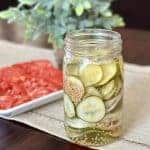
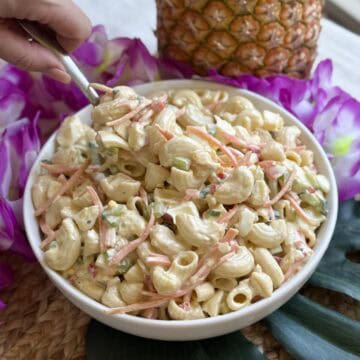
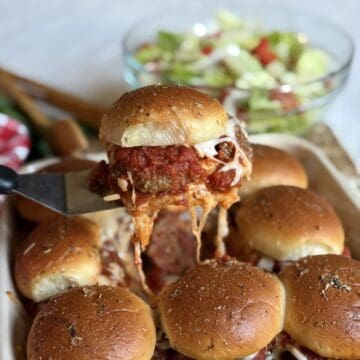



Beth Helmly
Can I use Allulos instead of sugar?
Laura Ashley
I haven't personally tried using allulose, but after a quick search, I see that there are lots of low-carb/keto pickle recipes that use it successfully. 🙂